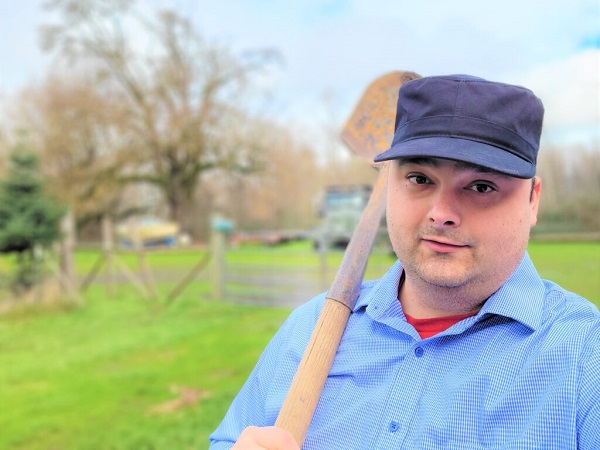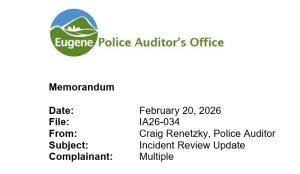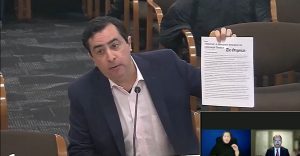Meet the candidate: Levi Leatherberry for CD4
14 min read
Running to succeed Peter DeFazio, Libertarian and Independent Party candidate Levi Leatherberry.
[00:00:05] Levi Leatherberry: Hi. I’m a local farmer, an Independent and a Libertarian candidate as well. Both these parties want to provide an alternative to the two you see before you today, the Republican and the Democrat. They always focus on social issues that never go anywhere.
[00:00:22] These financially, they’re the same behind the scenes. The ones increasing housing prices are donating, the ones increasing health care prices and pharmaceuticals. Even the beginning of this discussion of pharmaceutical companies helping sponsor this right now, this is why prices are affecting you in health care, the grocery store, the pump—they’re all products of this sort of oligarchy in D.C. and both parties financially are the same.
[00:00:52] I’m trying to provide an alternative where we actually target the finances, the financial corruption at the heart of our democracy that is corroding things that affect us in our everyday lives.
[00:01:05] I’m a farmer. I’ve seen how my land changes based on their policies, how my ability to feed my family is affected by their policies. And they will promise and promise until the end of time that they will change these things. But if you look in their pocket and look at their fundraising, they cannot, because you cannot be funded by the problem and also be the solution at the same time.
[00:01:28] Why can’t people just run for office and not take money? Every election we try to warn you guys and you keep picking the same teams. Please consider new blood in this system.
[00:01:39] John Q: Levi spoke at a candidate forum sponsored by the Eugene and Springfield City Clubs, the League of Women Voters, and local public libraries.
[00:01:49] Chris Lehman (KLCC): How would you sum up Peter DeFazio’s time in office?
[00:01:54] Levi Leatherberry: Actually, me and Alek (Skarlatos) both grew up under his rule. I’ve never known Oregon without DeFazio, so that means a lot of the problems I grew up with that got worse were under his rule. He has a positive reputation. He has done positive things. He, his reputation in the House (of Representatives) is pretty good because he challenges both sides throughout time.
[00:02:17] However, when it comes to actions, he’s the head of infrastructure committee, one of the most famously corrupt sectors in the American economy. Construction, where roads cost more in Oregon than they do in Paris or in Italy, where we get gouged with prices every time we build anything, and that has gone unchallenged.
[00:02:37] So the words are great, but the actions are getting more and more corrupt every year. So I’m not so sure how good he was about corruption, but about words and promises, he was very good.
[00:02:49] Chris Lehman: The Washington Post today reported that nearly 300 so-called election deniers are on the ballot. Can you state without equivocation who won the 2020 presidential election? And more broadly speaking, what, if anything, should be done to bolster Americans’ confidence in the electoral process?
[00:03:06] Levi Leatherberry: I think that Biden won in 2020, and I don’t have any problem saying that. A lot of the corruption doesn’t come during the general, it’s during the primaries when all the millionaires and fundraisers make sure that only candidates who take the biggest donations get through. So that’s really where the corruption happens. If we want to improve it, we can remove primaries or we can try to invest more in getting money out of politics, which is the main complaint people have.
[00:03:33] It’s not that they don’t have good promises. Politicians have famously excellent promises, but promise actions. So that I think taking money out or not doing primaries would be a good solution.
[00:03:44] Chris Lehman: Republican Senator Lindsey Graham introduced a bill that would ban most abortions after 15 weeks of pregnancy nationwide. Would you vote for Graham’s bill?
[00:03:54] Levi Leatherberry: I support abortion. This district supports abortion. And those rights on a state level actually make more sense to be able to delegate that on a state level as that’s how Democrat system works. But the real question you have to ask is why when the Democrats had super majorities for many years, they didn’t codify it.
[00:04:12] If that was so important to them, why didn’t they codify decade after decade, opportunity after opportunity? Thousands of options. It’s probably because it’s very good to talk about in every election. And so not having it just be a law allows you to endlessly talk about it and fundraise and distract from the fact that trillions of dollars witnessing in the last COVID stimulus, mostly to people who at inside connections to DC and the Republican and the Democrat parties.
[00:04:39] So we don’t talk about money, we talk about these social issues forever.
[00:04:42] Chris Lehman: What approaches do you advocate for to ensure that Americans have access to affordable quality healthcare?
[00:04:50] Levi Leatherberry: Val Hoyle was just talking about healthcare. She’s one of the biggest recipients of pharmaceutical money, big pharma money in this state, has a long relationship with like Eli Lilly and all these big companies and affecting even the prices of things. So you cannot have affordable healthcare while you’re on the team increasing the cost behind the scenes.
[00:05:13] So yes, you can promise and promise more people get covered. That just means more money in your pocket because you’re getting bigger profits off of every individual.
[00:05:21] So unless we take out pharma money in these decision making, it’s never going to be affordable. You’re just getting ripped off from the right or the left. So if we want it affordable, we’ve got to lower the cost by actually going after the people price gouging the American public.
[00:05:36] Chris Lehman: How do you plan to address the housing and homelessness crisis across Oregon?
[00:05:41] Levi Leatherberry: One of the big ways is to go after the price. So I’ve said this about healthcare, but it’s true for housing as well.
[00:05:48] If you actually look at housing prices and why they’re going up, it’s not purely supply and demand. There’s big actors from mega contractors who get sweetheart deals and no big contracts from federal candidates like these ones. And also on the housing level, the people who fulfill those contracts and whether the money disappears, real estate moguls, and a lot of stuff that happens on Wall Street.
[00:06:14] If you don’t look into the bank accounts of politicians who benefit from real estate deals, you’re never going to get cheap real estate because the regulator who’s supposed to be catching these guys, changing the prices is the one actually helping change them. So we’re like, oh, we’re having this PR problems with affordable medicine and housing and homelessness is just spiking all across the country. It’s because we’re making life harder and harder for everyday people.
[00:06:42] Chris Lehman: If elected, would you support a bill that would require candidates for president and vice president to release copies of their tax returns?
[00:06:50] Levi Leatherberry: Yes, because it’s the main problem we have with these candidates is that they’re being influenced by money and everybody knows that. That’s why Congress has a 20% approval rating. And I know this is not just for the Congress, but it’s universal to American politics, that the money is what makes the decisions.
[00:07:09] And I’ve said this over and over again today, but that is probably the single, that’s like the chokepoint of all these policies—anything you want to get done in America won’t get done unless the person making money, in charge, gets a piece of the action. Unless we can change that, we’re never going to get what we want as voters.
[00:07:29] Chris Lehman: Would you vote to continue this child expanded child tax credit? And what other tools should the federal government use to fight child poverty?
[00:07:38] Levi Leatherberry: The Democrat party is actually really good about this. The data shows that investing in limiting childhood poverty has a lot of good outcomes for society. The main difficulty, I mean, everybody wants to support children not being poor, right? Morally, but a lot of people battle over the price. But I would mention just two years ago when the COVID stimulus passed, there’s only $1.7 something trillion dollars in circulation and every man, woman, and child in this country, and they spent that money, both these parties working together over and over again and gave it to companies that helped their races.
[00:08:13] So we could have eliminated child poverty by this year with that money multiple times over. So putting the money where the mouth is the main issue, but they have good policies.
[00:08:23] Chris Lehman: Unemployment during the coronavirus crisis reached record levels in Oregon. How would you help our local economy recover from the effects of the coronavirus?
[00:08:34] Levi Leatherberry: Small businesses, everybody knows, had a really hard time during the pandemic. We’ve had unprecedented amounts of small businesses and jobs being lost to everyday Americans because of this event. However, things like the Small Business Association giving most of their money to franchises who qualify as small businesses—if you’re a hotel or a restaurant chain, all you have to do is get your local guy to claim—like he’s McDonald’s, owns McDonald’s local, he can claim to be a small business. That’s not what most people mean when they talk about small business. So if we put the money in the correct place and we make the correct terms and actually invest in the working class and entrepreneurs, I think we can make a lot of progress in recovering from this pandemic financially.
[00:09:16] In terms of health, that’s an individual decision and we just need an investment in making healthcare more accessible to people in these events.
[00:09:23] Chris Lehman: And turning now to foreign policy. Russia’s invasion of Ukraine has been widely condemned. What role, if any, should the United States play?
[00:09:32] Levi Leatherberry: I’ve lived outside of America for a long time, long enough to not trust our military-industrial complex. I think that helping Ukrainians is good because Putin shouldn’t have invaded, but I think that there’s become so incredibly profitable to stay in there and all the money we keep giving them and enormous amounts of billions and billions of dollars from of the most corrupt countries in Europe, money disappearing on the ground and not actually going to fighting the war even is going into corrupt politician’s pockets and making corruption even worse in the country.
[00:10:03] And so I think if we could find a way to support the people, but not this giant military-industrial complex, that would be ideal. However, like things like the pipelines getting blown up and that being questionably the American thing, it’s very controversial right now, but America stands to profit enormously from this, and I, even though there’s no real evidence, I can say clearly either way.
[00:10:26] You kind of look at this complicated situation and you realize that profit really seems to be driving it and not this deep caring for the Ukraine people who are being used as like cannon fodder for these big profits.
[00:10:38] Chris Lehman: How do you end the epidemic of violence against women as well as sexual assault and sexual harassment?
[00:10:44] Levi Leatherberry: Actually, there’s been some positive news on this front. Statistically, domestic violence in some parts of America have gone down significantly.
[00:10:52] It’s by investing in resources for these women who are getting mistreated by their spouse or their loved one, by giving more resources by alleviating poverty and by, it’s a multifaceted issue, just by making life better for everyday women, by getting higher salaries, by getting higher opportunities to start small businesses and be leaders in the community.
[00:11:15] I think that it’s hard to approach it from any one policy, but like a system of policies that value them higher and our current system doesn’t put enough money into this issue.
[00:11:26] Chris Lehman: In August, the most recent month for which figures are available, the US Customs and Border Protection reported 203,000, quote, ‘encounters’ along the Southwest land border. It’s an average of more than 6,500 every single day. What is your reaction to those numbers, and what proposals do you have related to the current immigration system?
[00:11:49] Levi Leatherberry: Stop playing politics and a comprehensive immigration reform. (Green Party candidate) Mike (Beilstein) also made an interesting point about how the sheer numbers coming at us are actually about our policies in their countries making it difficult to start a business in Guatemala.
[00:12:04] A difficult to start a business in Honduras is our relationship with their economy has a huge effect on how many people come here because they can’t just live happily at home. And so both the International Strategic Aid package, as well as comprehensive immigration reform at home could do that. But you have to ask yourself why election after election, both the right and the left talk about immigration reform, but it never gets done.
[00:12:27] There’s a black market in America for all the major companies like Walmart, who use cleaners, who are illegal immigrants, and to the tune of billions and billions of dollars. It also, these large waves coincide with the biggest opening signs everywhere. There’s job opening signs everywhere after COVID, and so there’s more jobs available and they fill these jobs to the lowest wage people possible to get profits. And so that’s why we don’t have reform.
[00:12:52] Chris Lehman: Wildfires are an annual presence seemingly in the fourth district as we speak. What role, if any, should the federal government play in forest management, and would those policies reduce the scourge of smoke that plagues our communities each year?
[00:13:06] Levi Leatherberry: We want to preserve the old growth. We want to do a forest management strategy, there is a way we can manage it better to minimize fire, and also preserve the nature and the environmental quality of soils there.
[00:13:18] However, every year when a fire comes, it’s basically like we’re acting like we’re surprised, and we hire all these private forces, this army of people who can charge whatever they want and always do.
[00:13:30] And we pay eight times more than we did the same exact strategy 10 years ago. And so if we don’t look at why these numbers and we, if we don’t get a larger standing force in the state and at the federal level who are ready for these fires every year, we’re going to pay these jacked up prices that make it so difficult to fight the fire because we don’t have the money to fight the fire and we don’t have the people ready to fight the fire. We have to kind of scramble to get all these private teams together.
[00:13:57] Chris Lehman: If elected, what specific policies and legislation will you advocate to reduce our country’s greenhouse gas and methane emissions, freeze construction of new coalfire power plants, and invest in a new clean energy economy?
[00:14:11] Levi Leatherberry: So whenever we’re talking about protecting the environment, we have to identify who’s actually degrading it. Now we know that there’s many, many different things from businesses all around the world to our diet, towards what we eat, all these things go into one thing, but one big thing you have to remember is that the Democrats and the Republicans are older than the fossil fuel industry.
[00:14:30] From its infancy, from the first day, they helped grow it up, like, they’re involved financially in all these plans. And even when it comes to Green New Deal, a lot of them are, the people supporting the Green New Deal are getting some of the biggest funders from fossil fuels behind the scenes. So they’re saying one thing and doing another.
[00:14:50] That’s the biggest problem with the environment. For decades they’ve been saying one thing and doing the other because of money. And so we need to actually confront the politicians who are getting this fundraising and cut off the ties between them if we want real action.
[00:15:07] Chris Lehman: Measure 114 on the Oregon ballot this year would create a permit system for the purchase of firearms and would also place limits on so-called high-capacity ammunition magazines Do you plan to vote for or against Measure 114. And secondly, what, if any, proposals do you have for gun regulation at the federal level?
[00:15:26] Levi Leatherberry: I actually probably wouldn’t support it, even though I do want progress made towards gun violence. But a law that comes down to enforcement of existing laws—our existing laws are good and could be slightly tweaked to have high efficiency.
[00:15:41] It’s easy to press new legislation with no teeth. That never actually comes into reality and only affects a few small people who really care about this issue, not the average person. The average person needs to be able to defend themselves. And a lot of these capacity limit things are really about making your at-home firearm (that you currently had that holds like 15) unusable, cause you make it to like seven or eight or five or 10, you have to buy a new gun. So it’s really just about making everyday Americans’ life harder, rather than it is about safety, or making the country better.
[00:16:11] Chris Lehman: Do you support granting statehood to the District of Columbia?
[00:16:15] Levi Leatherberry: I would support statehood. A lot of people answer this question because they assume it’ll be democratic or liberal, and it’ll switch the bounce against the conservatives. It’s like this political gerrymandering in the background. I don’t care about that. I care about the fact that they paid taxes, give more people in D.C. than some other states, and they don’t get represented at the federal level. I think just as a democracy, we need to uphold those values.
[00:16:40] Chris Lehman: We’ll close with two-minute closing statements. Now we go to Levi Leatherberry.
[00:16:46] Levi Leatherberry: I’d say two big things is that there’s money and there’s party, and that’s where everything goes wrong. This enormous amount of money, all these candidates receiving the millions of dollars makes so they can’t confront people who are being corrupt is then they can just point it back at them on any big issue.
[00:17:03] So you can’t really tackle why things are getting worse. You can promote policies that require hundreds of other people to get your back and to agree with you, and that’s where party comes in. Party: You cannot step one inch out of line from what they tell you in D.C. This happened in my town, Eugene, just last year, Rep. Marty Wilde.
[00:17:26] He talked about how the Democrats were redistricting this district to disadvantage Alek (Skarlatos), which is true. They did do that and it was on purpose and he was against it. They cut him out of his own district to punish him so he can’t run again. This goes to show you, you can never step one inch out of party line.
[00:17:45] So both these guys, they might be good individuals, but the money they’ve taken means they can’t confront corruption and the parties they have say they can’t ever step out of the issue that is decided in D.C. by big donors. So you’re not going to get any of these promises. This is why they have a 20% approval rating, both of them as a team.
[00:18:04] Bipartisan corruption, nothing happens because people ignore the power of money and party. I have neither. I can do things that are for my community, for District 4. I don’t need to consult with D.C. or some big, rich guy behind closed doors about what I’m going to do. I can just do it and I can actually get results.
[00:18:27] John Q: Running for the Libertarian and Independent Parties to succeed Peter DeFazio, Eugene resident Levi Leatherberry. He was interviewed by Chris Lehman of KLCC.





